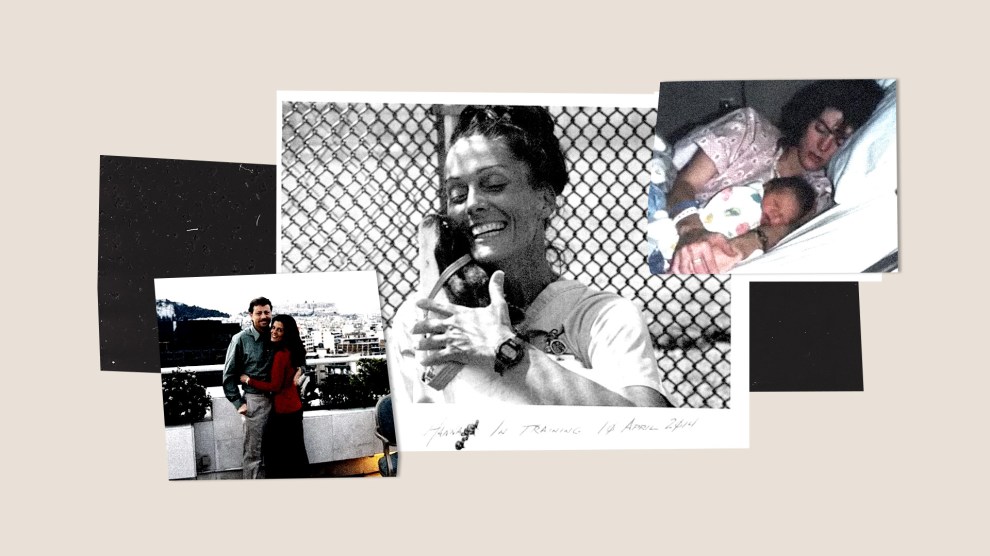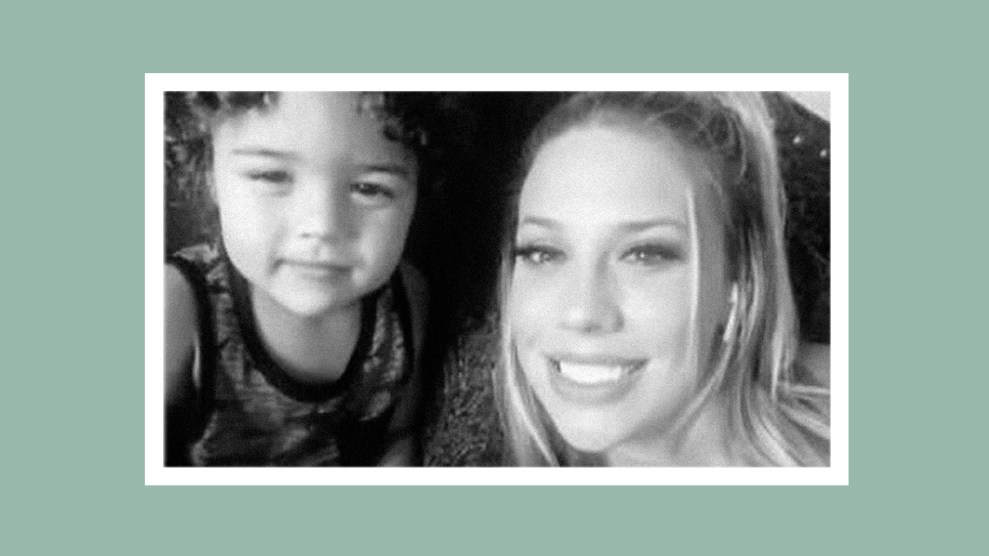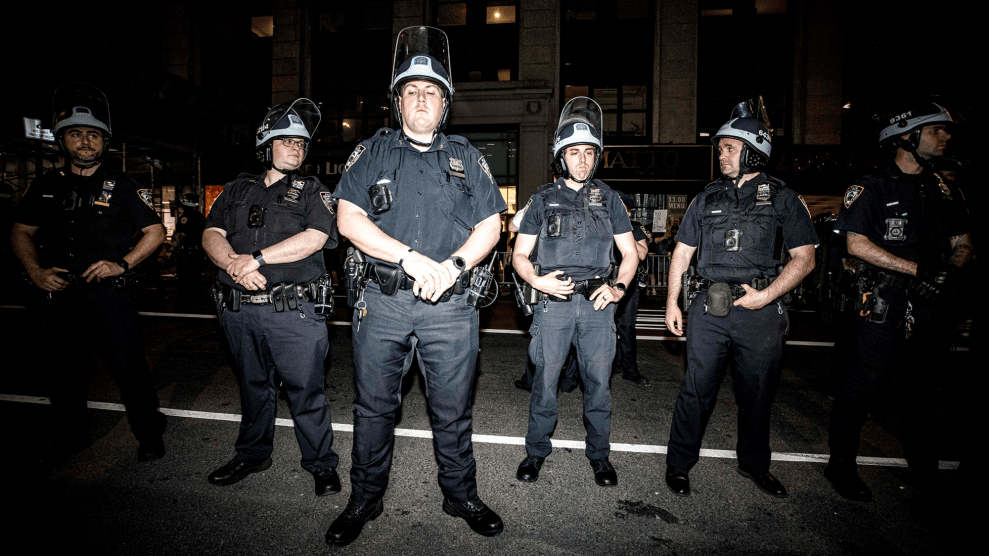
Mother Jones illustration; Photos courtesy of April Wilkens
April Rose Wilkens called me last month from a prison cell in Oklahoma, sitting on her metal bunk bed as she looked at an old photograph of her 4-year-old granddaughter, whom she’s never met, snuggled up against her son. “I want to play with her. To be there for my son,” she told me. In her last phone call with her family, her granddaughter asked her why she was in prison. Wilkens wasn’t sure how to respond.
For the past two and a half decades, Wilkens has been in prison for killing her ex-fiance, the wealthy son of a car dealership owner in Tulsa. But in her view, the crime was not so simple. Terry Carlton had repeatedly abused her during their relationship, according to court records. In 1998, when she was 28, she shot him eight times one night after he allegedly held a gun to her head, raped her, and then handcuffed her in his house. She says she pulled the trigger in self-defense.
Despite extensive evidence of her injuries—including a medical exam that documented vaginal abrasions and tears—the prosecutor claimed she was “cry[ing] rape,” and the jury convicted her of first-degree murder. A judge sentenced her to life in prison at Mabel Bassett Correctional Center, separating her from her son, then just 8 years old. Wilkens became one of an untold number of domestic violence survivors serving time around the country after trying to defend themselves or committing crimes as a result of their abuse. “I felt like I was drowning,” she recalls of the conviction.
Her one consolation was that, despite the life sentence, the judge left open the possibility that someday she’d be eligible for parole. But since then, she’s been denied release at every opportunity, even though she has stayed out of trouble in prison. She suspects it’s partly because Carlton’s family doesn’t want her to get out. And the board likely wants her to show more remorse, to stop presenting herself as a victim. Around the country, “this is a huge barrier” for incarcerated survivors seeking parole, says Colby Lenz, a co-founder of the national advocacy coalition Survived and Punished.
Yet recently, Wilkens has started to harbor some small amount of hope that she might get out another way. In June, two attorneys in the state, Colleen McCarty and Leslie Briggs, launched the podcast Panic Button to spread the word about Wilkens’ case. Now they’re lobbying Oklahoma lawmakers to draft and pass a bill that would let courts resentence certain survivors of abuse—specifically, ones whose crimes were related to the domestic violence they experienced.
It’s a tall order: Only a few states have passed bills like this before, and none of them are as conservative as Oklahoma. But if the attorneys succeed, it could potentially help hundreds of people. Some of them are serving time under the state’s controversial failure-to-protect law, which I recently investigated. The law is meant to prevent child abuse by criminalizing parents who were not necessarily violent themselves but failed to prevent another person—often a romantic partner—from harming their child. In a groundbreaking analysis, my colleague Ryan Little and I found that hundreds of parents were charged under the Oklahoma law since 2009, and the vast majority of those who went to prison were women; some of them could not protect their children because they were also being abused by their partner. One of those women is Kerry King, a mother whose case I profiled and is featured in this new Mother Jones documentary. (She received a 30-year prison sentence, 12 years longer than the man who beat her kid.)
Oklahoma incarcerates more women than almost any other state—and many of them were previously abused. As Wilkens tells me, “I am just one of many.”
Across the country, a shockingly high number of people are serving time after surviving domestic violence. Studies have found that upward of 90 percent of incarcerated women in some state prisons experienced physical or sexual assaults before landing behind bars.
In many cases, the abuse didn’t just precede the arrest—it contributed to it. “The abuse itself can be a pipeline to being criminalized,” says Cindene Pezzell, the legal director of the National Clearinghouse for the Defense of Battered Women. Some survivors fight back or kill their abusers in self-defense. Others are coerced by abusive partners into other types of criminal activity like drug dealing or violence against a third party; they follow their abuser’s orders to break the law, fearing the consequences of insubordination. Then there are those who start using illicit drugs themselves to cope with their trauma, or who commit a crime while attempting to escape from the relationship. “When you boil it all down,” says Pezzell, this type of criminal behavior “has to do with survival.”
In 2019, New York passed a landmark law to provide second chances to incarcerated survivors like these. The Domestic Violence Survivors Justice Act gives judges the power to resentence them to shorter prison terms if they can show a significant link between the domestic violence they experienced and their crime. The law is one of a handful around the country that aims to help survivors get out of prison sooner, and reform advocates in some other states are now trying to pass versions of it, including the attorneys working with Wilkens in Oklahoma. In New York, the statute applies not just to survivors of intimate partner violence, but to people who endured violence at the hands of parents or other family members—whether physical, sexual, or psychological in nature. It also allows judges to offer relief in new cases, making it easier for them to offer shorter sentences for defendants who can prove their domestic trauma contributed significantly to their offense.
It’s unclear how many incarcerated New Yorkers are now eligible for resentencing under the law; courts don’t systematically track the abuse histories of defendants. But attorneys estimate that more than 100 people in the state’s women’s prisons might have viable cases, along with some in male prisons. So far, despite court slowdowns during the pandemic, at least 29 of them have been resentenced, according to Kate Mogulescu, an attorney and associate professor at Brooklyn Law School who has assisted some of them. Collectively, these people reduced their prison terms by about 60 years.
In recent years, California lawmakers also approved bills to help incarcerated domestic violence survivors seek relief if they meet certain criteria. And in 2016, Illinois enacted a law that lets them ask for a new sentence if evidence of their abuse was not originally presented at their trial. Not many other states have followed suit. Politicians may worry about appearing soft on crime or rubber-stamping what critics characterize as a “Get Out of Jail Free” card.
But these laws are far from a free pass out of prison. In fact, attorneys say survivors have faced serious challenges getting out. In New York, they must go through a multi-step application process for resentencing and prove through documentation and testimony that they were abused. “If you’re abused, especially if you’re in a population on the margins like an undocumented person or someone who’s afraid to go to law enforcement or report to a doctor, you’re probably not going to have medical records,” says McCarty, one of the attorneys in Oklahoma, who leads the Appleseed Center for Law and Justice there. “Maybe some family member knows” about the abuse and can testify, adds Alan Rosenthal, a defense attorney in New York who has worked on these cases, “but lots of times, the victim of abuse is isolated from their family and community.”
Another hurdle: Under New York’s law, the judge who originally heard a case is the one who decides whether to resentence, with full discretion to say no. “Once somebody is labeled as a murderer, prosecutors and judges have no willingness to look at a person and their history,” says Lenz of the group Survived and Punished. “Some judges have embraced reform, but there have been judges who just turned a blind eye,” adds Rosenthal, the New York attorney. One of his clients was recently denied resentencing, even though she had years of psychotherapy records documenting the abuse she suffered, as well as corroborating records from child protective agencies. “If the judge doesn’t understand the dynamics of domestic violence, then the statute is going to fall on deaf ears,” Rosenthal says.
Even with evidence, adds McCarty, “there is still this larger cultural issue of people just not believing women.” At least 18 incarcerated New Yorkers who sought resentencing under the law were rejected because the judge didn’t agree with their case, according to Mogulescu, the attorney and professor at Brooklyn Law School. The prospect of being doubted again in court is enough to deter some survivors from even applying. “Many survivors had such a horrific experience when they were first prosecuted—not believed, torn apart. There’s a real hesitation to put yourself out there, to go back to that same court and seek relief,” she says.
Still, attorneys say, New York’s law is a step in the right direction. “The [resentencing] numbers aren’t as high as people would like them to be, but there are survivors getting released who would not have been released otherwise,” says Pezzell of the National Clearinghouse for the Defense of Battered Women. Reform advocates in Connecticut, Oregon, Washington, and New Jersey are among those who have reached out to New York attorneys for advice about trying to pass similar laws.
In Oklahoma, the attorneys working with Wilkens, the woman serving time for killing her ex-fiance, have found at least one lawmaker who might help them do the same. State Rep. Toni Hasenbeck, a Republican, has agreed to carry an interim study on the issue of resentencing for domestic violence survivors in the state. If the study goes well, the goal would be to introduce a bill early next year.
Passing a law like this in Oklahoma could have a big impact. McCarty, the attorney, estimates that 500 women who are now incarcerated in the state were convicted of crimes stemming from domestic violence.
Living in prison creates even more trauma and makes healing difficult, Wilkens says. “Being a rape survivor, the strip searches are particularly dehumanizing,” she tells me. Other aspects of prison life also remind her of the domestic violence she experienced, like the lack of control over her schedule and movement. Plus, it’s not uncommon to see fights, even at the hands of correctional officers. “Being incarcerated feels like an abusive relationship, except it’s with the state of Oklahoma instead of with Terry,” she says.
Wilkens was most recently denied a parole hearing in March. In a letter, the parole investigator told her that the “aggravating factors associated with the original crime, including any DA or victim protest, currently outweigh any mitigating factors in support of parole at this time.”
She hopes new evidence about her case, highlighted on the podcast, might help people understand the pressure she was under at the time of her offense. She even has an audio tape she recorded of Carlton admitting that he’d assaulted her prior to the night in question, and not denying that he’d raped her previously, but it was never presented during trial. “She did everything she could have possibly done,” says McCarty, the attorney. “She reported to police, she kept records, she took pictures.”
As Wilkens waits for her next opportunity to plead her case to the parole board or for lawmakers to pass a law, she continues to think of her granddaughter. In their recent phone call, after questioning why Wilkens was in prison, the 4-year-old asked whether she was okay there, whether she was happy, and whether she might be allowed to go home soon. Not right now, Wilkens told her. Still, she tries to imagine things changing.”I want to make it a better world,” she tells me, thinking again of her granddaughter, “so she won’t have to go through anything like this.”













